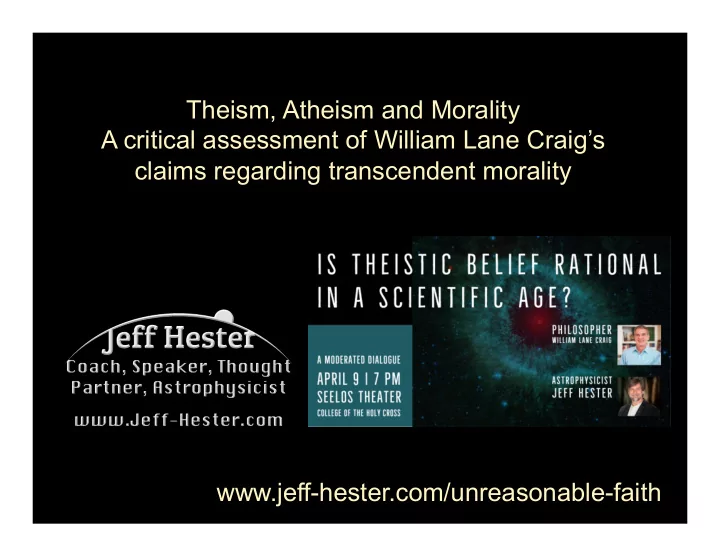

Theism, Atheism and Morality A critical assessment of William Lane Craig’s claims regarding transcendent morality www.jeff-hester.com/unreasonable-faith
1. “Transcendent” moral values do not exist. The kinds of “felt” values described by WLC are like all other perceptions − constructed parts of our internal models of the world and strongly influenced by our tribes. Such very non-transcendent moral perceptions are anything but objective. • WLC acknowledges this explicity when he ways our apprehension of moral values and duties is analogous of our apprehension of the physical realm. • WLC does not like the notion that moral/ethical values are not given by God. But what Bill likes or doesn’t like, along with $5, will buy him a cup of coffee at Starbucks. 2. If moral values are transcendent, they should be equally accessible to all. They are not: • Moral values can be altered chemically • Moral values can be altered by physical manipulation (e.g., Transcranial Magnetic Stimulation) • Moral values are contingent upon emotional state • Moral values are lacking in some people (psychopathy) • Differences in moral values have physical signatures in brain structure and function • Moral values differ widely across different cultures Dr. Jeff Hester / Unreasonable Faith
3. Perceived “transcendent” moral values are just as expected for patterns arising from sociobiological imperatives. • WLC acknowledges this explicity when he ways our apprehension of moral values and duties is analogous of our apprehension of the physical realm. • Empathy and similar emotions are adaptive and hard-wired in most. They arise from neurological mechanism such as mirror neuron networks. • Theory of mind is an important part of our sociobiology, predisposing us to attribute to other tribe members the states we experience. • Our sense of moral obligation arises in proportion to our evolutionary stake in outcomes (selection pressures), and are largely restricted to our perceived in-group (tribe). The only thing we place ahead of tribe in moral judgments is kin, and there it is the kin with whom we share the most genetic material to whom we feel most “moral” obligation. • Religion is primarily about distinguishing in-group from out-group. This is reflected in shared moral attitudes within religious communities. • Tribal demands readily override moral values. For example, we routinely kill (and worse) those considered out-group at the behest of our tribes. • The list goes on. Again, our “felt” moral attitudes and behaviors are exactly the sorts of constructions one would expect to find based on evolutionary pressures and tribal loyalties. Dr. Jeff Hester / Unreasonable Faith
4. Perceived moral values and their theistic implementation do a great deal of harm. • By strengthening tribalism, theism serves to dehumanize members of out-groups, making immoral actions easier to carry out, more common, and more callous. (Examples range from the modern terrorism of ISIS, to the role of religion in genocides, to horrors from the history of Christianity, such as the Inquisition and the Crusades.) • Much “perceived” morality reflects other emotions such as revulsion. • Religious morality and tribalism provide a means of controlling populations and turning them to what truly are objectively immoral ends. • Profoundly, objectively immoral attitudes and practices fostered by Theistic belief include: - Denying food, shelter, medical care, etc. based on happenstance of birth - Prejudice and oppression based on religiously condoned attitudes toward gender, sexuality, race, beliefs, etc. (More in-group/out-group dynamics.) - Failure to accept stewardship by putting things in “God’s hands.” (E.g., global warming.) - Religion readily corrupted to immoral, self-serving ends (e.g., wealth Gospel) - Direct motivation for immoral acts (slavery, female genital mutilation, etc.) - Theism tends to promote hard even if inconsistent divisions between “right” and “wrong,” thereby inhibiting practical progress on moral and ethical issues. - Theism promotes abnegation of responsibility (God’s Will be done) - Federal Task Force on Religious Liberty to “Fight the dangers of secularism” Dr. Jeff Hester / Unreasonable Faith
5. Non-theistic moral values and responsibilities can be made objective, as well as far superior to “transcendent” Theistic claims about morality. • Sociobiological factors such as empathy and theory of mind form a good start toward objective moral values • Non-theistic formulations of objective morality exist. For example, suppose that you were to be placed into a society, but had no idea what your circumstances or identity would be. How would you want that society to be organized, and how would you expect its members to behave? • Non-theistic approaches to morality and ethics require definition of terms and consideration of what makes something moral or not, resulting in a better, more flexible and nuanced morality capable of being adapted. • Non-theistic approaches to morality and ethics require sorting out “values” that are actually based in in-group/out-group distinctions, revulsion, etc. • Non-theistic moral values can adapt to changes in our understanding of the human condition. For example, better understanding of the origins of homosexuality demanded modification of what for many were moral issues. Theism was and remains he greatest single roadblock to those changes. 6. A personal account of my own moral values and comments on the experiences of our children. Dr. Jeff Hester / Unreasonable Faith
Recommend
More recommend